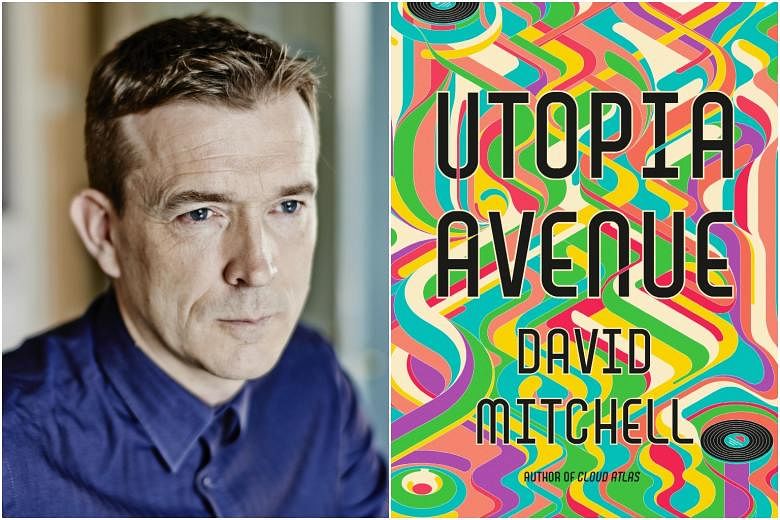Review
FICTION
UTOPIA AVENUE
By David Mitchell
Sceptre/Paperback/ 563 pages/$29.71/ Available here
4 stars
2020, most would agree, is not a fun year to be living in. Enter one of the most transporting novels of the year, in which British author David Mitchell takes readers on a glorious nostalgia trip to the London of the Swinging Sixties.
It is a time and place awash in what musician and producer Brian Eno calls "scenius", the confluent genius of a cultural scene. Floating somewhere between the psychedelic Summer of Love and the dark side of the moon is Utopia Avenue, an impossible destination, an address for a place that cannot exist.
This is the eighth novel by Mitchell, a two-time Booker Prize-shortlisted author best known for the nested narratives of Cloud Atlas (2004).
Broke blues bassist Dean Moss gets an invitation to join the eclectic, genre-bending band that will go on to be named Utopia Avenue.
His new bandmates are Elf Holloway, a folk singer fresh from a bad break-up, professionally and personally; Peter "Griff" Griffin, a rough-edged jazz drummer from Yorkshire; and Jasper de Zoet, an enigmatic virtuoso guitarist who spent years in a mental asylum.
After a rocky start, they experience a meteoric rise to fame that culminates in an American tour before tragedy strikes.
For fans of the Sixties, this is not a novel to be missed. It is a panoply of cameos from a who's who of music legends, a milieu where one could bump into John Lennon under a table at a party, flirt with Leonard Cohen in a Chelsea Hotel elevator or run into a yet-to-be-famous David Bowie in a stairwell, regaling strangers with his dreams.
Characters hang out with Brian Jones, The Rolling Stones' founder, Jimi Hendrix and Janis Joplin. All three died in real life at the age of 27 between 1969 and 1970.
Utopia Avenue is also part of the wider web that is Mitchell's metafictional "uber-novel". Characters from his other books make appearances, like Levon Frankland from The Bone Clocks (2014), the band's surprisingly decent manager. Jasper, a descendant of the protagonist of The Thousand Autumns Of Jacob De Zoet (2010), listens to a sextet composed in Cloud Atlas.
This will be delightful to Mitchell acolytes and baffling to people new to his canon, rock music or both.
The novel's structure is based on the track listings of the band's three albums, with each chapter told from the point of view of whoever wrote that song. This is largely divvied up between Dean, Jasper and Elf, the band's songwriters.
Dean runs through a gallery of tabloid scandals: a paternity dispute, an adulterous affair and even a stint in Italian jail for alleged drug possession - set against the grim backdrop of his hardscrabble childhood with an abusive father.
Elf struggles to hold her own in a male-dominated industry, where the handful of successful female musicians are like "princesses in the age of dynastic marriages", as she confides to Joplin. They are reduced to fodder for locker-room bragging, agrees Joplin. "How do you fight it? Or change it? Or survive it?"
Jasper's story arc is the most bizarre - which, for a Mitchell novel set during the height of psychedelia, is not saying much. The illegitimate scion of a blue-blooded Dutch house, he has gone through life with a malevolent entity he calls Knock Knock inside his head, who, after years of dormancy, is now determined to take over his body.
In a band, the drummer usually gets short shrift. That is the case for Griff, though he does get a chapter to himself. So does Levon, who - being Jewish, gay and Canadian - is no stranger to the prejudices of the era. Their chapters, brief but tender, sit at the heart of the novel.
"Writing about music is like dancing about architecture" is an aphorism that has been attributed to many. Mitchell puts it in the mouth of musician Frank Zappa, quoting jazz great Charles Mingus.
Of course, by this point in the novel, Mitchell has already spent more than 500 pages writing about music, showing off his prowess at describing the indescribable.
A song is "riff-sticky"; singer-songwriter Joni Mitchell's voice is "vodka-on-ice". He writes of the Cloud Atlas sextet: "An oboe has lost its way. Upon hearing a violin in the thorns, the oboe picks a path towards it, metamorphosing into what it seeks."
"In 50 years," says Jasper, "or 500, or 5,000, music will still do to people what it does to us now." Utopia may be a non-place, but with Mitchell's words, one feels one might see it again someday on the avenue.
If you like this, read: Daisy Jones & The Six by Taylor Jenkins Reid (Ballantine, 2019, $17.66, available here), an oral documentary about the rise to fame and abrupt split of a 1970s rock band.


